British Columbia has officially applied for intervener status for court challenges against the Trans Mountain pipeline expansion.
According to The Canadian Press, the province filed the papers with the Federal Court of Canada on Tuesday.
The court has combined 19 lawsuits from First Nations, local governments and environmental organizations into one. Those suits want the court to overturn the National Energy Board’s review process into the project, whichwill see an expansion that is expected to triple the oil shipped by Trans Mountain’s parent company, Kinder Morgan, via the pipeline from Alberta to shipping docks in Burnaby.
The NEB recommended the $7.4 billion-project’s approval in 2016 with 157 conditions. Prime Minister Justin Trudeau gave the federal government’s authorization in November.
The move formally confirms an action Attorney General David Eby said would be coming at a press conference Aug. 10. That’s when Eby and Environment Minister George Heyman announced the new B.C. NDP government had hired Thomas Berger to advise it on fighting the pipeline in court. Berger is a former provincial NDP leader, a B.C. Supreme Court judge and chair of three royal commissions, including ones involving a pipeline and First Nations.
Eby told The Canadian Press, since the majority of the pipeline is in the province it should be granted intervener status because the Alberta government already has. Even though the NDP is the governing party in that province, it supports the expansion while the B.C. government does not saying it’s an environmental risk to the province’s coastal waters.
Eby expected a decision on the province’s application to not take long because the legal challenges are scheduled to be heard this fall. The province, he added, is still developing the arguments it will bring to the court if it attains intervener status.
The previous B.C. Liberal government issued an environmental certificate for the project prior to the May 9 provincial election. But Heyman told the press conference earlier this month, of the eight permits issued only three can be acted upon because the other five haven’t had adequate consultation with First Nations.
Trans Mountain has announced it plans to start construction in September, but Heyman said until those conditions have been met the company can’t put shovels in the ground.



